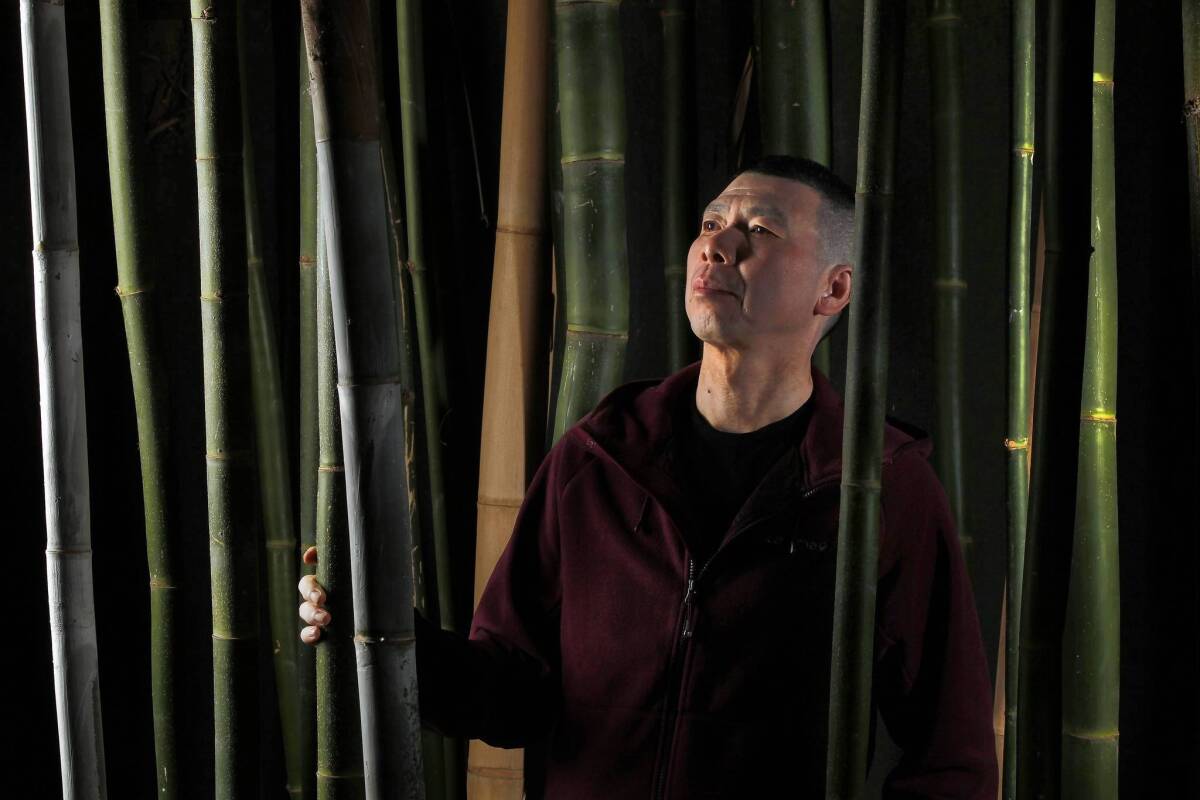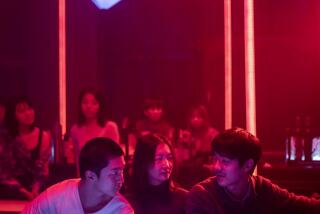Feng Xiaogang on China today and back in ‘1942’

It would be easy for Feng Xiaogang to rest on his laurels. After all, the Chinese film director has churned out a string of wildly popular comedies, made China’s first Imax movie, “Aftershock,” and is now in the Oscar hunt for the second time with the drama “Back to 1942,” which received a limited release in the U.S. a year ago. A real-life story of war and famine that killed millions, it is the country’s entry for 2014’s best foreign film. (“Aftershock” was China’s selection three years ago.)
Feng’s international profile took another leap forward in November when he left his handprints at the TCL Chinese Theater in Hollywood. Yet for all his success, the director at 55 seems to be in a restless state — in recent months, he’s spoken out about how Chinese censors are holding back his nation’s film industry, mused about moving to the U.S. and taken audiences to task for seeking out only mindless entertainment.
Asked to name films and directors he admires, he reaches back to “The Godfather” and “Apocalypse Now,” then mentions the current work of his countryman Jia Zhangke, whose “A Touch of Sin” wowed at Cannes with its story of corruption, frustration and violence in modern Chinese society but looks to have run into trouble from China’s censors and has yet to be released there.
“A lot of film nowadays is like an icy cold Coke on a really hot summer day,” Feng said on a sunny fall afternoon in Beverly Hills, puffing cigarettes in the backyard of a friend’s estate. “It feels really good once you watch it, but once it’s gone it’s gone. The films I want to make are like a shot of strong vodka. Once you have it, the feeling lingers inside.”
Following is a condensed version of our conversation:
You seem to be at the top of your game in China, yet recently you talked about wanting to live in the U.S. and maybe do something a little different. What’s going on?
I’ve been making films nonstop, at least one a year, without a break, for so long. It would be nice to have two years off and not think about films at all. … In China, there’s always meetings and such, it’s so busy. Here it’s easier to relax. The weather is nice, and the air is really good.
Would you like to work in Hollywood? You already know some folks here — in “1942,” Tim Robbins plays a priest and Adrien Brody plays Time magazine correspondent Theodore H. White.
I don’t know what I can do in Hollywood, but it definitely would be a nice place to write. My friend just bought this place, and he offered to let me come here and do that.
It took a long time to make “1942.” What hurdles did you face?
When I first read Liu Zhenyun’s novella “Remembering 1942” 17 years ago, it was shocking. For the first time, I felt like I knew what the Chinese culture was like. Before, it was really hard to know who we really are. Because what we read from books and learn at school is really limited — we only know what they want us to know about, basically. Though this is a novel, I felt it was the most truthful thing I had ever read.
ON LOCATION: Where the cameras roll
I went to the actual place [Henan province, site of the famine] and did interviews as well, so I feel it’s very close to reality. China is growing so fast, and a lot of youngsters have a really superficial life — they only want to be happy, they only want what’s fun and entertaining, they don’t want to hear about it if it’s not. They don’t want to think about what their grandparents’ lives were like — that even they may have been living like cannibals, their lives were so hard.
Although I loved the story 17 years ago, I wasn’t able to film it. I didn’t have enough experience — at that time I had been working on TV dramas but had done only, like, one film. And this would be a huge production. I couldn’t get that kind of funding. The market wasn’t mature enough. And I wasn’t mature enough.
Every single film I made up until this film, I grew personally, became more well rounded. And all my films made a lot of money — until “1942,” actually. With that kind of popularity I was able to take on such an unpopular subject. The production budget was around $40 million.
Were you satisfied with the box office?
It was pretty mediocre. Although many people think it’s a good film, it’s pretty depressing. We lost a little money. But I feel like the Chinese market really needed this. For quite a long time, people only wanted to make happy films and watch happy films. I made those happy films to get people ready for this, to get them to think again.
What’s the relationship like between censors and directors?
I think it’s really similar to the relationship between the U.S. studio boss and the director. The only difference is that sometimes studios hire directors with final cut. Studio heads will say OK, we did a survey, the audiences want this kind of ending and you gotta do this. The relationship is the same — only in China, they’re not basing their notes on what the audience wants but political reasons.
PHOTOS: Behind the scenes of movies and TV
Do you socialize with them?
Sure, we can go out and drink. Get them drunk and have them sign this! Think of it as two college friends, they both majored in literature. Once they graduated, one became a screenwriter and the other went to work for the censorship bureau. They have the same love for literature, but they have two very different jobs. His job is to criticize you, to pick on you.
The head of the censorship bureau right now is a pretty famous screenwriter. … With me, he is just like a friend, very relaxed. But if it’s a formal setting, a meeting or interview, he puts on another face. It’s pretty complicated.
Even in the U.S. many people don’t care to know history. But it’s different when the government actively doesn’t want you to know things. When did you become passionate about this idea?
Nowadays, young people in China have this misconception that China is the best country in the world. We’re so strong, we’re growing so rapidly, we’re doing so well. They tend to forget China has only been doing well for a few decades. Before that it was a lot of struggle. The censorship folks, when I talked to them, they said an audience won’t like to watch a film like this, they don’t want to be reminded that this is what life was back in the day. They want to keep believing that we’re so strong, we’re going great. That’s why I’m so thankful to the producers. Everyone knew going into it that this film wasn’t going to do well.
You’ve said you think “1942” is the closest thing to an Oscar-level film that can be made under the current system in China. Do you think, though, that there’s a hesitancy among Oscar voters to reward this film because doing so would sort of quasi-endorse the censorship process?
I hope that is a stretch — that the academy won’t go so far to think that picking “1942” would be rewarding censorship. One of the big problems in China is that the politicians always want to affect the artists and to get them to self-censor. That’s a weakness in China. I hope that doesn’t happen in the U.S. If the academy thinks about censorship when they’re looking at the film, you’re mixing art and politics again and putting politics first again. In my mind, I really respect the Academy Award. It’s a professional and fair review of your film. It would be disappointing to me if they have politics in mind when reviewing the films.
More to Read
Only good movies
Get the Indie Focus newsletter, Mark Olsen's weekly guide to the world of cinema.
You may occasionally receive promotional content from the Los Angeles Times.







